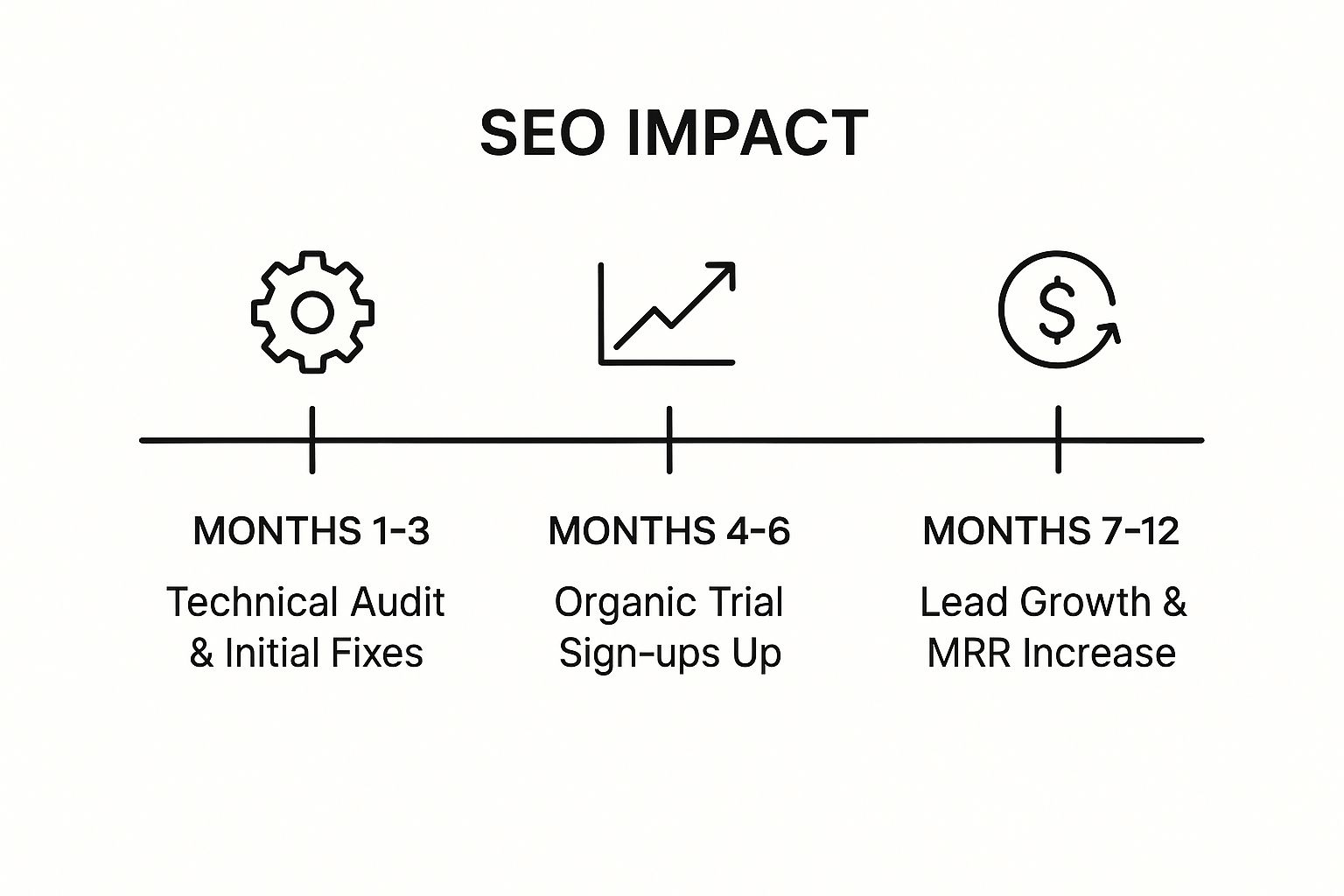If you've ever felt like you're just throwing money at paid ads with little to show for it, you're not alone. SaaS SEO consulting is all about building a reliable, long-term growth engine for software companies, one that doesn't shut off the second you stop paying for it. It’s a specific strategy designed to attract, educate, and convert high-value customers through organic search, perfectly suited for the unique challenges of the SaaS world—like recurring revenue models, long sales cycles, and feature-heavy products.
What Is SaaS SEO Consulting Really About

Let's get one thing straight: SaaS SEO consulting isn't about just fiddling with keywords or getting a few backlinks. It's a strategic partnership designed to turn your website into your best salesperson—one that works 24/7.
Think of it this way: generic SEO is like a family doctor. They're great for general check-ups and common problems. But SaaS SEO? That’s the neurosurgeon, performing highly precise operations on the complex anatomy of a software business.
The key difference is the business model. You're not selling a t-shirt someone buys on impulse. A SaaS customer goes on a much longer journey. They start by Googling a problem, then they compare different tools, and finally, they start looking for specific features before they even think about signing up for a trial.
An expert SaaS SEO consultant knows this funnel inside and out. They build a strategy that meets potential customers at every single stage. This focused approach is so important for a few big reasons:
- It creates a sustainable growth channel. Paid ads are like a tap—turn off the money, and the leads stop. Organic traffic is an asset that grows and compounds over time, bringing in leads consistently.
- It drives down Customer Acquisition Cost (CAC). Attracting people who are already looking for what you offer is far more cost-effective than interrupting them with ads.
- It builds market authority. When you rank for the most important terms in your industry, you become the go-to resource. Trust is built long before anyone ever speaks to a salesperson.
More Than Just Rankings
Chasing that #1 spot on Google is tempting, but effective SaaS SEO consulting looks beyond that. The real goal isn't just traffic; it's getting the right traffic that leads to real business results—trial sign-ups, demo requests, and paying customers. This means deeply understanding your product, your ideal customer, and what your competitors are doing.
The whole point is to transform your website from a simple digital brochure into a powerful machine that attracts, educates, and converts visitors into loyal users. It's about connecting your product's features directly to the problems your customers desperately need to solve.
The Specialized Skillset Required
A true SaaS SEO pro has to tackle challenges unique to this industry. They know how to handle keyword cannibalization between a feature page and a blog post trying to rank for the same term. They can structure a website that appeals to wildly different people, from a technical developer to a C-suite decision-maker. And they know how to build the kind of high-authority backlinks that a niche B2B product needs to stand out.
If you want to dig even deeper into this field, check out this comprehensive guide to SaaS SEO consulting.
Ultimately, this specialized expertise ensures your marketing efforts aren't just getting eyeballs but are directly growing your revenue and building a strong, defensible position in a crowded market.
The Blueprint for a Winning SaaS SEO Strategy

A truly effective SaaS SEO strategy is much more than a simple list of keywords. It's a detailed blueprint, one that meticulously aligns your product with the real-world problems your customers are trying to solve. Think of it like building a house: you wouldn't just start hammering nails without an architectural plan, right? The same logic applies here—you don't start creating content without a clear, structured strategy.
This blueprint stands on three core pillars that work in tandem to create a powerful, self-sustaining growth engine. Each pillar tackles a different, crucial aspect of how both search engines and potential buyers see your website. When an experienced consultant gets these three elements right, the results are not just impressive, they're built to last.
And the investment is well worth it. In the B2B SaaS world, a well-executed SEO plan delivers an average ROI of 702%. Many companies even hit their break-even point in as little as seven months, making it one of the most profitable marketing channels you can tap into.
Mastering the Technical Foundation
First up, we have technical SEO. This is the non-negotiable foundation of your entire operation—the plumbing, wiring, and structural integrity of your website. Nobody sees it, but everyone depends on it. For a SaaS platform, this is especially critical because you're dealing with complex web applications, dynamic content, and user accounts.
Any good SaaS SEO consulting engagement starts right here, making sure search engines can efficiently crawl, render, and actually understand your site. Some of the key technical tasks include:
- Optimizing Crawl Budget: Ensuring Googlebot spends its limited time on your most important pages, not getting lost in parameter-filled URLs or hitting dead ends.
- Improving Site Speed: Your pages have to load fast. Slow load times are a huge turn-off for users and a clear negative ranking signal. A mere one-second delay can tank conversions by 7%.
- Implementing Structured Data: Using schema markup to give search engines context about your content—things like pricing, reviews, or key features. This is what helps you earn those eye-catching rich snippets in the search results.
Without a solid technical foundation, even the most brilliant content is dead in the water. It’s the silent partner that makes everything else work.
Aligning Content with the Buyer Journey
The second pillar is all about on-page SEO and content strategy. Now that the foundation is solid, it's time to furnish the house. You're designing each room—each piece of content—to serve a specific purpose for your visitors.
For SaaS companies, this means carefully mapping content to every single stage of the buyer's journey. You need to connect with people from the moment they realize they have a problem all the way through to when they're ready to make a final decision.
A big part of this involves applying proven SaaS landing page best practices to get the most out of every visitor. The ultimate goal is to create a seamless, intuitive path from their first search to becoming a paying customer.
A winning strategy doesn't just chase high-volume keywords. It targets user intent. It's about answering the specific questions your potential customers are asking at each stage, guiding them from a problem-aware blog post to a solution-focused comparison page.
To bring this to life, here’s a quick look at the core components a consultant will focus on.
Key Focus Areas in SaaS SEO Consulting
| SEO Component | Primary Goal for SaaS | Example Tactic |
|---|---|---|
| Technical SEO | Ensure the site is crawlable, fast, and secure. | Fixing crawl errors and optimizing page load speed. |
| Keyword Research | Target intent-driven keywords across the funnel. | Identifying "pain point" queries for top-of-funnel content. |
| Content Strategy | Create assets that attract, engage, and convert. | Developing in-depth comparison guides for mid-funnel users. |
| On-Page SEO | Optimize individual pages for relevance and user experience. | Writing compelling title tags and meta descriptions. |
| Off-Page SEO | Build authority and trust through external signals. | Earning backlinks from reputable software review websites. |
| Conversion Rate Optimization (CRO) | Turn search traffic into sign-ups and demos. | A/B testing calls-to-action on high-traffic landing pages. |
Each of these areas is a critical piece of the puzzle, working together to drive meaningful business outcomes, not just vanity metrics.
Building Unshakeable Authority
Finally, the third pillar is off-page SEO. This is all about building your website's authority and reputation in the industry. If technical SEO is the foundation and content is the interior design, then off-page SEO is your home’s prime location in a prestigious neighborhood. It signals to search engines that you are a trusted, credible leader.
This goes way beyond just collecting backlinks. A specialized SaaS SEO consultant focuses on earning high-quality, relevant links from authoritative sources like tech journals, industry publications, and respected software review sites. These are the kinds of links that actually move the needle.
These three pillars—technical soundness, strategic content, and off-page authority—form the essential blueprint. A professional SaaS SEO consulting service doesn't treat them as a checklist. Instead, they weave them into a single, cohesive strategy designed for one thing: generating sustainable, long-term growth for your business.
Why SaaS SEO Is a Completely Different Ballgame

You can't just take a standard SEO playbook, slap it on a SaaS business, and call it a day. The software-as-a-service world is its own ecosystem with its own set of rules and some seriously tricky hurdles that can trip up even experienced marketers. A generic approach almost always falls flat because it completely misses the intricate problems that come with marketing a software product.
This is where specialized SaaS SEO consulting becomes so valuable. Think of these consultants as expert guides who have already mapped the terrain. They get that a SaaS website isn't just selling a one-off product; it's selling an evolving solution to a specific, often complex, business problem.
The Keyword Cannibalization Conundrum
One of the most common pitfalls I see is keyword cannibalization. Let's say you have a slick feature page for your "project management timeline" tool. But you also have a fantastic blog post titled "How to Create an Effective Project Management Timeline." Suddenly, both pages are fighting for the same search term.
When this happens, Google gets confused. It doesn't know which page to prioritize, so it might rank both of them poorly or cause their rankings to bounce around unpredictably. This internal competition splits your SEO authority right down the middle, tanking your chances of ranking for that valuable keyword.
A specialist knows how to untangle this mess by creating a clear content hierarchy, ensuring every page has a unique job and a distinct target keyword. Digging into some keyword research best practices is a great first step to building a solid foundation.
Speaking to Multiple Audiences at Once
Another huge challenge is building a website that can talk to completely different types of people at the same time. Your pricing page needs to resonate with a startup founder watching every penny, while your API documentation has to be crystal clear for a senior developer. These two people couldn't be more different—they have different goals, use different language, and care about different things.
A skilled consultant knows how to structure your site to cater to both audiences without confusing either. This isn't just about tweaking a few words; it's about a fundamental architectural strategy that might include:
- Distinct content hubs: Creating separate sections of your site for business use cases and ROI calculators, and another for deep technical specs and tutorials.
- Tailored on-page language: Using benefit-driven copy on commercial pages and precise, technical terms in developer-focused areas.
- Segmented user journeys: Making it easy for visitors to self-identify and follow a path that shows them only the information relevant to their role.
If you don't get this right, you end up alienating one audience in an attempt to win over another.
The core of effective SaaS SEO is understanding that you're not just optimizing for a search engine; you're optimizing for multiple, distinct human decision-makers who all play a role in the purchasing process.
The High Bar for Earning Authority
Finally, let's talk about authority. Building trust and credibility in a niche B2B software market is tough. You can't just write a few guest posts on random blogs and expect results. To get the kind of high-quality backlinks that actually move the needle, you need features in respected industry publications, tech journals, and top-tier software review sites.
This takes more than just a simple outreach email. It requires a strategy built around creating genuinely insightful, data-driven content that industry leaders actually want to talk about and link to.
These challenges—keyword conflicts, diverse audiences, and high authority thresholds—are exactly why a one-size-fits-all SEO strategy just doesn't work for SaaS. It takes someone with deep industry experience to navigate these waters and turn a website into a predictable growth engine.
How to Choose the Right SaaS SEO Partner
Picking an SEO partner for your SaaS company is a huge decision. Get it right, and you've just built the foundation of your growth engine. Get it wrong, and you’re looking at months of wasted time and money. This isn’t about just hiring another vendor; it’s about finding a strategic partner who truly gets the unique DNA of a software business.
The SEO industry is absolutely massive for a reason. Projections show the global SEO market hitting $74.90 billion in 2025 and rocketing to $127.30 billion by 2030. That kind of growth brings a flood of new providers into the market, which makes it even more critical to do your homework. If you're curious about the numbers, you can read the full research on the SEO market growth.
To find a real partner, you have to dig much deeper than their sales pitch and a few cherry-picked testimonials. You need to really test their understanding of the SaaS model itself.
Ask SaaS-Specific Questions
A general-purpose SEO agency will talk all day about traffic and rankings. A true SaaS SEO expert, on the other hand, connects every single action back to real business metrics. You need to come armed with questions that expose whether they actually have experience in your world.
Start by digging into how they handle different SaaS business models. The strategy for a product-led growth (PLG) company that lives and dies by free trials is worlds away from the approach for an enterprise solution with a six-month, demo-heavy sales cycle.
Here are a few questions that cut right to the chase:
- How do you approach keyword research for a developer persona versus a CFO persona? Their answer should immediately show you they understand how to target vastly different pain points and search intents.
- Can you show me a case study where you directly impacted MRR or trial sign-ups, not just website traffic? This is the ultimate test. It separates the pros who drive business outcomes from the amateurs chasing vanity metrics.
- What’s your process for auditing a complex web app with dynamic URLs and user-specific content? This question probes their technical SEO chops beyond a basic WordPress site.
Their answers will tell you everything. You'll know right away if they truly get the SaaS game or are just trying to fit your business into a generic B2C box.
Look for Strategic Thinkers, Not Just Tactic Implementers
A great SaaS SEO partner doesn't just work through a checklist. They become a strategic extension of your marketing team. They should be just as comfortable talking about your customer acquisition cost (CAC) and lifetime value (LTV) as they are about title tags and schema markup.
The goal is to find someone who thinks like a growth marketer, not just an SEO technician. They should challenge your assumptions, bring new ideas to the table, and focus relentlessly on how their efforts translate into tangible revenue.
This means they should be able to lay out a clear, phased strategy. What’s the plan for the first 90 days? How will they balance quick wins with the long-term work of building authority? An expert who can map out a realistic roadmap is demonstrating the strategic foresight you need.
Red Flags to Watch Out For
Knowing what to look for is only half the equation. You also need to know what to run away from. Certain promises and behaviors are massive red flags in the world of SaaS SEO.
Be extremely wary of anyone who:
- Guarantees #1 Rankings: No one can honestly guarantee a specific ranking on Google. This is a classic, old-school sales tactic used by untrustworthy providers.
- Focuses Solely on Backlinks: Links are crucial, but a strategy that over-indexes on link building without a solid content and technical foundation is doomed to fail.
- Lacks Transparent Reporting: You should get clear, regular reports that connect SEO performance to your actual business goals—leads, trials, demos—not just a list of keyword rankings.
- Offers a One-Size-Fits-All Package: Every SaaS business is different. If they’re pushing a canned SEO package, it’s a clear sign they use a cookie-cutter approach and lack strategic depth.
Making the right hire is half the battle won. By asking sharp, SaaS-specific questions and looking for a true strategic mindset, you can find a partner who will help you build a powerful and sustainable engine for organic growth.
Measuring the Real Impact of Your SEO Investment
So, how do you walk into the CFO's office and prove that your SaaS SEO consulting investment is actually paying off? It’s not about bragging about traffic spikes or a few top keyword rankings. Real success is measured by the numbers that hit your bottom line, drawing a clear line from organic search to actual revenue.
Forget the abstract stuff. The goal is to track the KPIs that genuinely define growth for a SaaS company. This means looking past simple traffic reports and zeroing in on how organic search is driving tangible business outcomes. It's about telling a clear, data-backed story that any stakeholder can immediately grasp.
This focus is critical. After all, 91% of SaaS companies report seeing better website performance thanks to SEO. And with 66% of B2B SaaS buyers leaning on search engines during their research, a strong, measurable presence isn't just nice to have—it's essential. You can discover additional insights on SaaS SEO statistics to see just how important this channel is.
From Clicks to Customers
The first move is to shift your focus from top-of-funnel metrics to bottom-of-funnel conversions. Sure, organic traffic is a decent starting point, but what that traffic does next is what really counts. An experienced SaaS SEO consultant will help you install solid tracking to monitor the actions that lead directly to revenue.
Your reporting should be all about these core metrics:
- Organic-Driven Trial Sign-ups: How many people who found you via a search engine started a free trial? This is your prime indicator of qualified interest.
- Demo Requests from Search: For SaaS businesses with an enterprise focus, this is a huge KPI. It shows that high-value prospects are finding you and want to talk.
- Lead-to-Customer Conversion Rates: Of all the leads coming from organic search, what percentage actually become paying customers? This metric speaks volumes about the quality of the traffic you're attracting.
- Impact on Monthly Recurring Revenue (MRR): This is the ultimate proof of ROI. When you can attribute new MRR directly back to specific SEO efforts, you have undeniable proof that your strategy is working.
By concentrating on these business-critical outcomes, you can confidently show the value of your SEO investment. It's a fundamental part of successful SEO lead generation for your business.
Visualizing the SEO Journey
SEO is a marathon, not a sprint. Progress doesn't happen overnight; it builds in stages, from foundational fixes to real revenue growth. The timeline below maps out the typical journey of a SaaS SEO project, showing how the initial technical work leads to more sign-ups and, eventually, a direct impact on MRR.

This visual shows that the early legwork in technical SEO paves the way for mid-funnel wins like trial sign-ups, which in turn fuel long-term revenue increases.
Building a Bulletproof Business Case
To make a truly compelling case for your SEO efforts, you have to connect the dots between your activities and their outcomes. For instance, if your consultant creates a series of blog posts targeting a specific customer pain point, you should be able to track precisely how many demo requests came from those articles.
The core principle is attribution. Every piece of content, every technical fix, and every backlink should be part of a strategy designed to move a key business metric. When you can draw a straight line from an SEO action to a new paying customer, you have all the proof you need.
This means properly setting up goals in your analytics tools, using UTM parameters for campaigns, and integrating your CRM with your website data. A great SaaS SEO consulting partner won't just run the strategy; they’ll help you build the reporting framework to prove its worth, turning your SEO program from a cost center into a documented profit center.
What a SaaS SEO Engagement Actually Looks Like
So, what happens when you actually hire a SaaS SEO consultant? A great partnership isn't about getting a random list of tasks. It’s about embarking on a structured journey designed to build momentum and deliver results that last.
Think of it like building a house. You don't just start throwing up walls on day one. First comes the survey, the blueprint, and a solid foundation. An expert SEO engagement follows a similar methodical path, breaking a massive goal into distinct, manageable phases. Knowing what to expect helps everyone stay on the same page.
The Critical First 90 Days
The first three months are all about discovery and laying a strong foundation. This initial phase is pretty intense and requires close collaboration, but it’s what sets the stage for all future success. Your consultant essentially goes from being an outsider to an integrated member of your growth team.
The goal here is to find the problems, map out the competitive landscape, and build a smart plan. Here’s what’s usually on the docket:
- Deep-Dive Technical Audit: The consultant will comb through every nook and cranny of your website. They're looking for any technical glitches—like slow page speed, indexing errors, or mobile usability problems—that might be holding you back from ranking.
- Competitor and Keyword Analysis: This goes way beyond just grabbing a list of popular keywords. It’s about understanding the entire search environment, figuring out what your top competitors are doing to win, and spotting high-intent keyword gaps that you can realistically own.
- Strategic Roadmap Development: All that digging and analysis leads to one thing: a detailed, prioritized action plan. This roadmap clearly outlines the key projects for the next 6 to 12 months, getting everyone aligned on what matters most.
By the end of this 90-day sprint, you’ll have a crystal-clear picture of your website's health and the exact steps needed to start gaining ground.
Months 4-6: Building Traction
With a solid strategy in hand, the next phase is all about execution. This is where the rubber meets the road, and you start seeing the first real signs of progress. The technical fixes from the first few months begin to kick in, and freshly optimized content starts pulling in the right audience.
During this period, the work settles into a steady rhythm of creating and optimizing. Your consultant will be focused on developing high-value content—think in-depth blog posts, "us vs. them" comparison pages, and landing pages built for different stages of the customer journey. These activities are central to any good SEO management plan, and you can learn more about what SEO management entails to see the bigger picture.
The goal in this middle phase is to shift from planning to winning. You should start to see early bumps in keyword rankings for your target terms and a noticeable lift in organic traffic to your new pages.
Scaling Growth from Month 6 Onwards
Once you hit the six-month mark, the game changes. Now, it's all about scaling what’s working and fine-tuning the strategy based on real performance data. The early traction you built up in months 4-6 starts to snowball, leading to tangible business results like more trial sign-ups and demo requests.
The long-term work involves a consistent cadence of content creation, authority building with high-quality backlinks, and regular performance analysis. This is where your patience truly pays off. The cumulative effect of months of focused effort starts to transform your SEO from a project into a predictable, powerful growth engine for your SaaS business.
Your Questions About SaaS SEO Consulting Answered
Investing in any new growth channel raises questions, and jumping into SaaS SEO is no different. Before you commit time and money, you need straight answers. Let's dig into the most common questions we hear from leaders who are thinking about bringing in an SEO partner.
How Long Until We See a Real ROI?
This is always the first question, and the honest answer is: it depends, but you can expect a predictable timeline. SEO isn't like flipping a switch for instant leads. A better way to think about it is like planting a tree—it needs time to set down roots before you see any fruit.
You'll see the first glimmers of progress pretty quickly. Within the first 3-4 months, you should be seeing foundational wins. These are things like critical technical fixes, the first few pieces of content going live, and some early movement on your target keywords. This is the essential groundwork that all future growth is built on.
But the real business impact—that steady stream of organic trial sign-ups and demo requests—takes a bit longer. Most SaaS companies really start to feel the momentum and see a tangible return on their investment somewhere between 6 and 12 months. The key here is patience, because the results truly do compound over time.
What Does SaaS SEO Consulting Cost?
The cost of SaaS SEO consulting is all over the map; there's no simple "one-price-fits-all" answer. What you'll invest really depends on your company's size, how competitive your corner of the market is, and the sheer scope of work needed to get you where you want to go.
Generally, you'll see a few common pricing structures:
- Monthly Retainers: This is the most popular model. You pay a set fee each month for ongoing strategy, execution, and reporting. It's perfect for building long-term, sustainable growth.
- Project-Based Fees: If you have a specific, one-off need—like a deep technical audit or building out your initial content strategy—this is your best bet.
- Performance-Based Models: These are less common, but you'll see them occasionally. Here, the fee is tied directly to hitting specific performance goals.
An investment can be anywhere from a few thousand dollars a month for a startup to tens of thousands for a large enterprise. The most important thing is to see it as an investment in a powerful, long-term asset, not just another monthly expense on the P&L.
Can't We Just Do This In-House?
Building an in-house SEO team is definitely an option, but it brings its own unique set of hurdles. The decision usually comes down to your available resources, existing expertise, and where your company is in its growth journey.
An in-house team brings deep product knowledge and is perfectly aligned with your company culture. But hiring a full-stack SEO team—a strategist, a content writer, a technical specialist, and a link builder—is both expensive and incredibly time-consuming.
A consultant or agency, on the other hand, gives you instant access to specialized expertise and battle-tested processes without the overhead of full-time salaries. They also bring a fresh, outside perspective and have likely seen what works (and what doesn't) across dozens of other SaaS companies, which can seriously speed things up.
Ultimately, there's no single right answer. Many companies find a hybrid approach works best, pairing an in-house marketing manager with an external SaaS SEO consulting partner to get the best of both worlds.
Ready to build a content engine that drives consistent organic growth? Copy Masters delivers search-optimized articles that establish your authority and turn your blog into a reliable source of traffic, leads, and sales. Learn more about our subscription-based content writing service.
- SaaS SEO Consulting for Predictable Growth - October 20, 2025
- What Is SEO Management Your Guide to Real Results - October 19, 2025
- A Guide to Quality Content for SEO That Ranks - October 18, 2025
